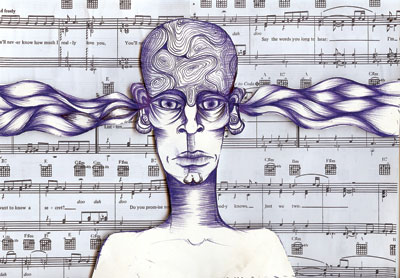All Nonfiction
- Bullying
- Books
- Academic
- Author Interviews
- Celebrity interviews
- College Articles
- College Essays
- Educator of the Year
- Heroes
- Interviews
- Memoir
- Personal Experience
- Sports
- Travel & Culture
All Opinions
- Bullying
- Current Events / Politics
- Discrimination
- Drugs / Alcohol / Smoking
- Entertainment / Celebrities
- Environment
- Love / Relationships
- Movies / Music / TV
- Pop Culture / Trends
- School / College
- Social Issues / Civics
- Spirituality / Religion
- Sports / Hobbies
All Hot Topics
- Bullying
- Community Service
- Environment
- Health
- Letters to the Editor
- Pride & Prejudice
- What Matters
- Back
Summer Guide
- Program Links
- Program Reviews
- Back
College Guide
- College Links
- College Reviews
- College Essays
- College Articles
- Back
Music's Benefit on the Adolescent Brain
Have you ever gone home, started your homework, and realized something is missing? You plug in your headphones play your favorite song, album, artist, or playlist, and are suddenly focused in. Music is an important part of life today. It is a source of entertainment- listening to fun songs with friends. It is an art- a way to express emotions. It is a way of communication- sharing music with people around you can bring you closer. But music is not only all this, it is also a something that can be used to create a strong focus while working and is generally beneficial to the human brain and specifically the adolescent brain.
Music and Mental Health
Music is mind medicine. It can reduce anxiety and depression, as well as improving mood, memory, and cognitive function. Adolescents represent a stage in development when stress levels are unsteady and cortisol levels are high. A meta-analysis of 400 studies from “thebestbrainpossible” shows that listening to music lowers the stress hormone- cortisol- in the brain. Ashford University also states that music has “also proven to be effective across a variety of treatment scenarios for conditions ranging from premature birth to depression to Parkinson's disease.” “I would say that music is just reflective of an adolescent’s life through the transition from childhood to adulthood.” says senior Musical Theatre major Chelsea Calfo.
Music and Brain Stimulation
On top of being a type of “medicine” for the mind, music is also a way to stimulate the brain and help increase productivity. In Elena Mannes’ study, “The Power of Music” through National Public Radio (NPR), she asserts the fact that “music stimulates more parts of the brain than any other human function.” Unlike most activities that humans participate in music stimulates the whole brain and this is regardless of the type of music that is being listened to. The auditory, motor, and limbic parts of the brain are still activated. Tests have also shown that listening to background music can increase productivity, enhance cognitive performance, and creativity. “In majors we listen to music as we do our work,” says Visual Artist, Tova Engel, “it is super helpful because it allows us all to do our own thing and really focus on our art.”
“Music enhances reading and literacy skills, reasoning and mathematical abilities.” Every morning when students walk into Mr. Underwood’s AP Calculus class he has music playing, The genre of this music changes. For example, he starts of the week with “Maestro Monday” where he plays classical music and on any other given day he might play alternative rock. This background noise that welcomes the students into the classroom and also continues to play while they work individually is a way to make students feel good and also help the brain keep working, especially through complicated math work. This is an example of music triggering the brain’s feel good center which is an “integral part of the pleasure-reward and motivational systems and plays a critical role in learning.” Adolescents are in an important stage in life, especially when it comes to learning. Middle school, high school, and college students are at a climatic point of their education, listening to music while they work Is a way to excite the brain and encourage more effective learning.
Research done by Dr. Jonathan Burdette, a nueroradiologist at the Wake Forest Baptist Medical Center, further proves the benefit of music on the brain. Dr. Burdette conducted a study where he and his fellow investigators used a technique called functional magnetic resonance imaging (fMRI), to detecting changes in blood flow in the brain. The team scanned 21 people while they listened to music that they said they both liked and disliked from a choice five genres (classical, country, rap, rock and Chinese opera) and to a song or piece of music they had previously named as their personal favorite. The listeners' preferences, not the type of music they were listening to, had the greatest impact on the brain’s connectivity- especially on a brain circuit known to be involved in internally focused thought. To summarize, Dr. Burdette’s research shows that listening to music that you like will improve brain connectivity especially when doing independent work that requires a lot of internal thought and reflection. As students in an age of technology, adolescents spend a lot of time working in solitude on computers or even just doing work on paper alone, music can help teens focus while they do work like this that relies on inner thinking.
Overall, music is a key tool in the lives of adolescents. This is not only because it is something that teens like to listen to. Music can help improve the mental health of teenagers by steadying cortisol levels in the brain. It will also advance brain connectivity and focus amongst adolescents.

Similar Articles
JOIN THE DISCUSSION
This article has 0 comments.
